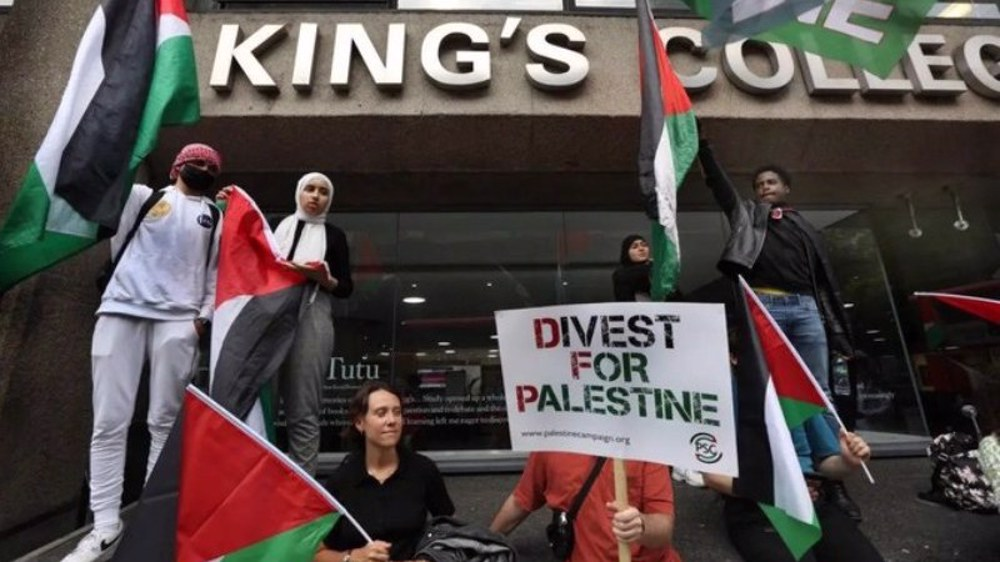
Pro-Palestine student protestors at the King's College London campus (file photo)
London, August 5 (RHC)-- King’s College London (KCL) has become the first college in the British capital to divest from companies supplying arms and military equipment to Israel, which has been waging a brutal war on the besieged Gaza Strip for the past ten months.
Under pressure from pro-Palestine student protest rallies and the anti-war sentiment across the United Kingdom and the rest of the world formed in the wake of the ongoing war on Gaza, the KCL decided to no longer invest in companies involved in the manufacturing of cluster bombs, land mines and depleted uranium weapons used by Israel’s military.
“I am pleased to announce that after a series of extensive negotiations, we have reached an agreement with King’s College London to revive their investment policy in arms companies in light of the genocide taking place in Palestine,” said Hassan Ali, the vice president of welfare and community at King’s College London Students’ Union.
Ali, along with Sadaf Cheema and Alizeh Abrar, faced a five-month suspension starting in December due to their support for Gaza and involvement in the students’ campaign for Gaza solidarity.
The divestment entails KCL halting all direct investments in companies like Lockheed Martin, L3Harris Technologies, and Boeing. These companies are prominent military suppliers for Israel, manufacturing cluster bombs, land mines, depleted uranium weapons, and other armaments.
“The university will no longer invest in companies engaged in the production or distribution of controversial weapons,” he added.
According to Ali, KCL’s finance executives have given their approval for the policy change and started its implementation. The agreement will be finalized and formally announced in October during the next investment committee meeting, he further said.
Earlier this week, The Times said in a report that the KCL would not invest in “controversial” arms following student protests in solidarity with Palestinians in the war-torn Gaza Strip, stressing that the university is revising its investment policy after students accused it of being “complicit in genocide” in Israel’s months-long aggression on the blockaded enclave.
Under the ‘Controversial Weapons’ clause in KCL’s Environment, Social and Governance framework a paragraph will be added detailing that the university will “not hold any direct or indirect (via pooled funds) investments in companies deemed to be engaged in controversial weapons,” the report said on Wednesday.
Ali noted that divesting from companies involved in Israel’s arms manufacturing was one of three requests students made to KCL leaders. The other two demands included a request for KCL to assist in the reconstruction of educational institutions in Gaza, and to cease indirect investments in banks and financial institutions that support Israel.
Ali also said that divesting from companies involved in Israel’s arms manufacturing was one of three requests students made to KCL leaders, with the other two being assisting in the reconstruction of educational institutions in Gaza and halting indirect investments in banks and financial institutions supporting the occupying regime.
“My analysis is that, in addition to halting direct investments, which we have achieved, KCL will agree on helping to rebuild Gaza’s educational institutions, but pushing the university to halt indirect investments will be difficult,” he further noted.
Across the globe, hundreds of student protests and solidarity camps have sprung up in response to Israel’s 10-month-long genocidal war in Gaza, with over 36 occurring solely in the UK.
Last week, Cambridge University declared it would reassess its stance on “responsible investment” following a lengthy student encampment in support of Palestinians on campus. It cited appeals from the student union that prompted the university to review of whether its investment policy is “in line with our institutional values.”
Last month, Swansea University students successfully pushed the university to divest £5m from the UK banking giant Barclays, which is known for providing billions of pounds worth of investment and loans to arms companies that sell weapons and military technology to Tel Aviv.

